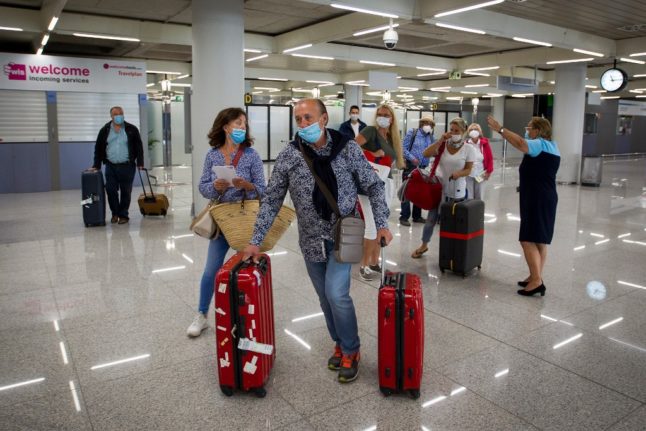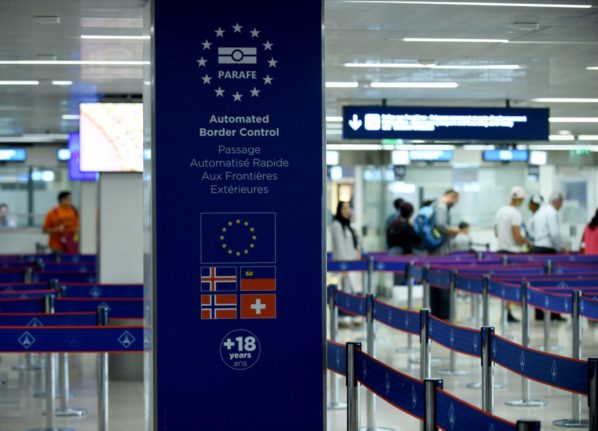The Spanish government has again extended temporary restrictions for non-essential travel (including tourism) from most third countries for another month, until June 15th 2022.
That means that non-EU/Schengen adults who reside outside of the EU and who haven’t been fully vaccinated against Covid-19 or recovered from the illness in the past six months cannot go on holiday to Spain during the next month.
Therefore, Spain continues to not accept negative Covid-19 tests from British, American, Canadian, Indian or other third-country nationals who are neither vaccinated nor recently recovered.
There had been hopes that the shorter two-week extension to the ban on non-essential travel issued on April 30th, as well as talk of the “orderly and progressive reopening” of the country’s borders, would mean that unvaccinated third country nationals would be allowed into Spain in May.
But in the end, Saturday May 14th’s state bulletin confirmed that Spain will keep the same measures in place for another 31 days, stating that they “will eventually be modified to respond to a change of circumstances or to new recommendations in the context of the European Union”.
Spain’s ban on unvaccinated non-EU travellers is arguably the last major Covid-19 restriction in place in the country, and other EU countries such as Sweden, Poland, Denmark, Czech Republic and Ireland are allowing unvaccinated tourists in.
This latest announcement by the Spanish government marks the umpteenth extension to non-essential travel from outside of the EU/Schengen area over the past two years of the pandemic, the previous one was due to expire on May 15th.
But perhaps this extension is the most surprising, as the Spanish health ministry has modified its rulebook to treat Covid-19 like the flu and the country wants to recover the tourism numbers it had pre-pandemic.
The ban affects unvaccinated British tourists in particular, as the UK is still the biggest tourism market for Spain, but Britons’ non-EU status means they have to follow the same Covid-19 travel rules as other third-country nationals.
Vaccinated or recovered third-country travellers
Those who were fully vaccinated against Covid-19 more than two weeks prior to travel to Spain will need to show a valid vaccination certificate with an EMA or WHO approved vaccine.
If their initial vaccination treatment was completed more than 9 months ago (270 days), they’ll need to show they’ve had a Covid-19 booster shot.
As for non-EU/Schengen travellers who have recovered from Covid-19 in the past six months, they will need to show a recovery certificate to prove this.
According to Spain’s Health Ministry, recovery certificates accepted as valid are those “issued at least 11 days after the first positive NAAT or RAT, and up to a maximum of 180 days after the date of sampling”, as well as being issued by the relevant authorities.
Exceptions
In early February, Spanish authorities also decided to start allowing unvaccinated non-EU/Schengen teenagers aged 12 to 17 to visit Spain for tourism if they provided a negative PCR.
Spain continues to have a small list of low-risk third countries whose travellers visiting Spain for non-essential reasons can enter without having to present proof of Covid-19 testing, recovery or vaccination.
This is updated weekly and can be checked here by clicking on the PDF under “risk and high risk countries/areas”.
READ ALSO: Can I travel to my second home in Spain if I’m not vaccinated?
If you’re not vaccinated or recovered, the exceptions for travel to Spain from third countries that fall under the non-essential travel restrictions are:
- You are a resident in the EU or Schengen country.
- You have a visa for a long duration stay in an EU or Schengen country.
- You work in transport, such as airline staff or are in a maritime profession.
- You work in diplomatic, consular, international organisations, military or civil protection or are a member of a humanitarian organisation.
- You have a student visa for a country in the EU or Schengen zone.
- You are a highly qualified worker or athlete whose work cannot be postponed or carried out remotely.
- You are travelling for duly accredited imperative family reasons.
- You are allowed entry due to force majeure or on humanitarian grounds.
- And as mentioned earlier in the article, if you have a vaccination certificate that Spain’s Ministry of Health recognises, as well as for any accompanying minors (unless they’re under 12 years of age).
READ ALSO: When do I need to fill out Spain’s Covid health control form for travel?



 Please whitelist us to continue reading.
Please whitelist us to continue reading.
Member comments